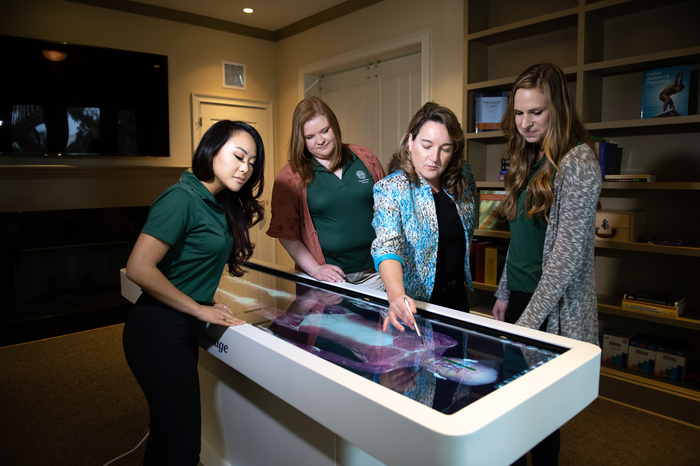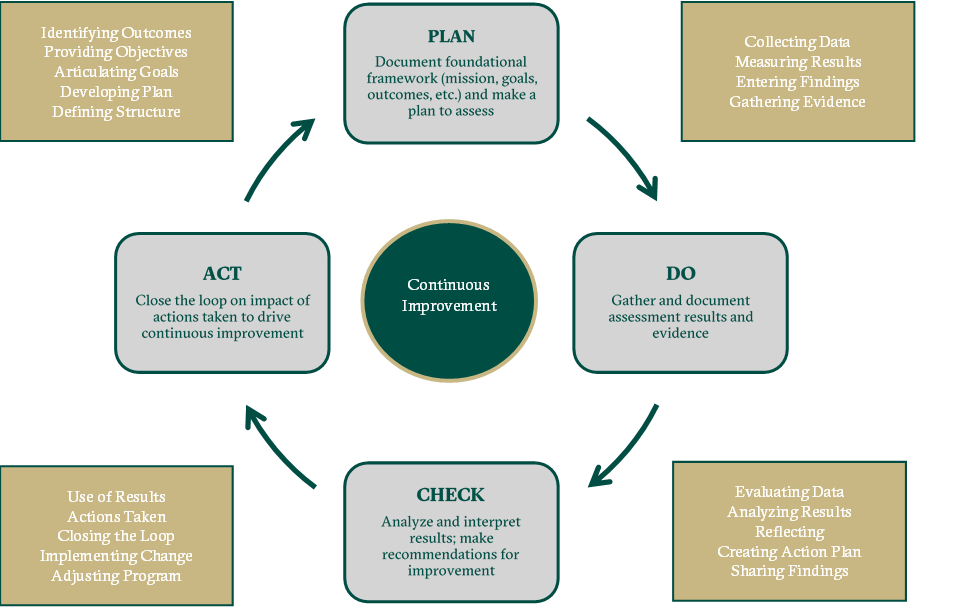Academic Assessment

Jacksonville University (JU) has a comprehensive, integrated planning and assessment
process. Planning and assessment occurs at the institutional level and extends to
the classroom level. It is a cyclical process whereby plans are developed and implemented
on an annual basis, outcomes are assessed, and findings are used to guide improvements.
To achieve this process, the University utilizes an online assessment system that
allows users to align their goals and objectives with those of the University.
Annual plans and reports should serve a greater institutional purpose than merely
stating activities undertaken in a given fiscal year. Rather than being episodic events
that occur for a few days each summer, meaningful assessment planning and reporting
should drive our efforts. To be fully effective, planning documents should be fully
integrated and allow us to document how our work in individual offices contributes
to larger divisional and University-wide goals.
Instead of waiting until the summer months to revisit what has occurred, why it has
occurred, and the impact it may have had, a more meaningful planning and reporting
process calls for continual engagement and reflection of the effectiveness of our
programs and programs. Institutional effectiveness should be viewed as a process of
continuous improvement.
The components of Annual Plans and Reports include: Mission, Vision, Long-Range Goals,
Annual Goals, Student Learning Outcomes (where appropriate), Major Activities, and
Use of Results from Previous Academic Year(s).
Beyond being a best practice internally, sound planning and evaluation processes
on campus provide continued compliance with the expectations of SACSCOC. Section 7
of the SACSCOC Principles of Accreditation discusses:
Effective institutions demonstrate a commitment to principles of continuous improvement, based on a systematic and documented process of assessing institutional performance with respect to mission in all aspects of the institution. An institutional planning and effectiveness process involves all programs, services, and constituencies; is linked to the decision-making process at all levels; and provides a sound basis for budgetary decisions and resource allocations.
Specifically, SACSCOC standard 8.2.a asks for evidence of compliance that:
The institution identifies expected outcomes, assesses the extent to which it achieves these outcomes, and provides evidence of seeking improvement based on analysis of the results in the areas below:
a. student learning outcomes for each of its educational programs
Moreover, Standard 7.1 specifically asks us to demonstrate compliance with:
The institution engages in ongoing, comprehensive, and integrated research-based planning and evaluation processes that (a) focus on institutional quality and effectiveness and (b) incorporate a systematic review of institutional goals and outcomes consistent with its mission.
To ensure we truly position ourselves, the Planning and Reporting cycle will be built around the Plan-Do-Check-Act paradigm as demonstrated below.
Institutional Student Learning Outcomes
Jacksonville University students will:
Master the depth of knowledge required for their academic program, including:
- Articulating disciplinary and interdisciplinary theories, concepts, principles, and practices
- Synthesizing curricular and co-curricular knowledge
- Applying knowledge from core courses, discipline-based courses, and co-curricular experiences in a range of contexts to solve real-world problems and make decisions
Apply critical thinking skills, including:
- Evaluating, analyzing, and integrating information from a variety of sources
- Using appropriate strategies, tactics, and tools to represent, analyze, and integrate information
- Developing critical, reasoned positions, and innovative and creative solutions to make informed decisions and evaluations
Communicate effectively, including:
- Speaking publicly, in both formal and informal contexts, demonstrating skills such as appropriate selection of topic and materials, clear organization, effective presentation, and the ability to adapt to audience, setting, and occasion
- Organizing thoughts and feelings, synthesizing relevant information and concepts, and effectively, clearly, and persuasively communicating perspectives through written language
- Listening actively and critically
- Presenting work effectively to a range of audiences
- Effectively communicating original and creative ideas, which may include performance, design, or visual representations such as maps, tables, and graphs
Master relevant skills for their chosen career, profession, or passion, including:
- Using talent, imagination, and skill to create works of art or perform
- Applying relevant professional standards and expectations to their field of study
- Demonstrating behaviors consistent with the relevant legal and ethical framework
- Utilizing the newest technologies to ensure readiness
Assessment Repository
See current annual assessment plans in our repository.
Timeline and Relevant Materials
Annual plans for the current academic year are due to OAP September 30. Annual Reports for the previous academic year are due to OAP June 30. All plans and reports are to be entered through Campus Labs Planning.

